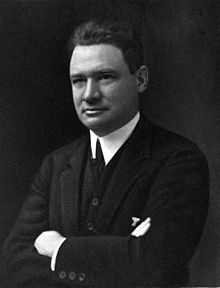Frederick Converse
| Frederick Converse | |
|---|---|
 | |
| Signature |
|
Frederick Shepherd Converse (January 5, 1871 – June 8, 1940), was an American composer of classical music.
Life and career
Converse was born in Newton, Massachusetts, the son of Edmund Winchester and Charlotte Augusta (Shepherd) Converse. His father was a successful merchant, and president of the National Tube Works and the Conanicut Mills. Frederick Converse's higher education was at Harvard College, where he came under the influence of the composer John K. Paine. Converse had already received instruction in piano playing, and the study of musical theory was a most important part of his college course. Upon his graduation in 1893, his violin sonata (op. 1) was performed and won him highest honors in music.
After six months of business life, for which his father had intended him, he returned to the study of composing, Carl Baermann being his teacher in piano, and George W. Chadwick in composition. He then spent two years at the Royal Academy of Music in Munich, where he studied with Joseph Rheinberger, completing the course in 1898. His symphony in D-minor had its first performance on the occasion of his graduation.
During 1899-1902, Converse taught harmony at the New England Conservatory of Music in Boston. He then joined the faculty of Harvard University as instructor in music, and was appointed assistant professor in 1905. Two years later he resigned, and afterwards devoted himself exclusively to composition.
Among Converse's notable students were Alan Hovhaness (1911-2000) and Florence Price (1888-1953). See: List of music students by teacher: A to F#Frederick Converse. He died in Westwood, Massachusetts.
Composition
Even though he was firmly committed to composing in the late Romantic idiom of his European contemporaries, his works often dealt with American subjects. The lush orchestral scoring of his program music has been compared to the early style of Richard Strauss. In 1910, Converse's opera The Pipe of Desire became the first American work ever to be performed at the Metropolitan Opera in New York. Today, Converse is best known for his symphonic poem The Mystic Trumpeter (1904), based on the poem of the same name from Walt Whitman's iconic anthology, Leaves of Grass.
With Opus Number
- Festival of Pan Op. 9
- Endymion's Narrative Op. 10
- Night and Day Op. 11
- String Quartet Op. 18
- The Mystic Trumpeter Op. 19
- The Pipe of Desire Op. 21 An opera in one act, text by George Edward Barton. It has a legendary subject, of Celtic origin. It is based upon the mingling of the old pagan nature worship and the incoming Christian morality. The story rests upon the principle that man may force the way of his desires against the divine order but that he pays the penalty. The work is an avowed fantasy.
- Overture, entr'actes and incidental music to Percy MacKaye's “Jeanne d'Arc” Op. 25
- The Sacrifice Op. 27 An opera in three acts, text by Converse. The scene is laid in California at the time of the Mexican War, and the characters, some of whom are Americans, enact a modern tragedy.
Without Opus Number
- The Peace Pipe
- Sonata for Cello & Piano
- Flivver Ten Million
Family
He married, 6 June 1894, Emma Tudor, daughter of Frederic Tudor of Brookline. They had five daughters.
Notes
References
- Kennedy, Michael (2006), The Oxford Dictionary of Music, 985 pages, ISBN 0-19-861459-4
 This article incorporates text from a publication now in the public domain: Homans, James E., ed. (1918). "Converse, Frederick Shepherd". The Cyclopædia of American Biography. New York: The Press Association Compilers, Inc.
This article incorporates text from a publication now in the public domain: Homans, James E., ed. (1918). "Converse, Frederick Shepherd". The Cyclopædia of American Biography. New York: The Press Association Compilers, Inc.
External links
| Wikimedia Commons has media related to Frederick Shepherd Converse. |
- Free scores by Frederick Converse at the International Music Score Library Project
- Liner Notes for Naxos CD 8.559116
- List of composers performed and unperformed operas at USOpera.com
|